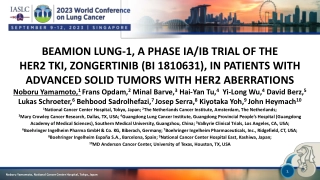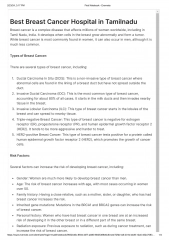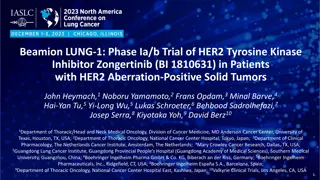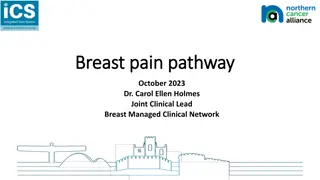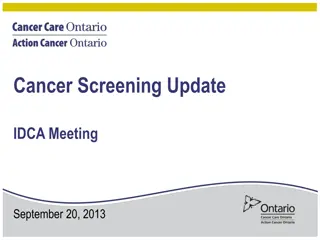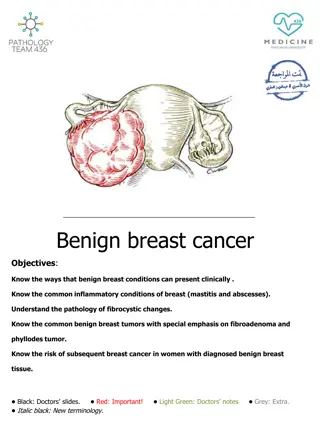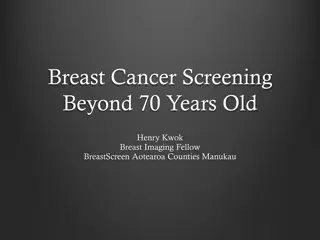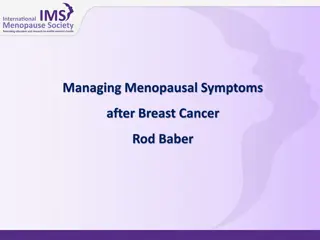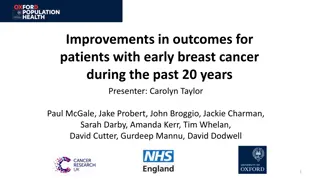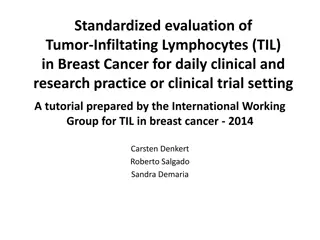Optimal Management of HER2-Positive Breast Cancer: Striving for Consensus
This event on March 2, 2021, gathered experts in the field to discuss the optimal management of HER2-positive breast cancer. The agenda covered topics such as early breast cancer management, treatment sequencing for metastatic disease, and real-life case scenarios. Speakers shared insights on COVID-19 vaccines and their implications in breast cancer care. A diverse panel of medical oncologists contributed to the discussion, providing valuable perspectives on different patient cases.
Download Presentation

Please find below an Image/Link to download the presentation.
The content on the website is provided AS IS for your information and personal use only. It may not be sold, licensed, or shared on other websites without obtaining consent from the author.If you encounter any issues during the download, it is possible that the publisher has removed the file from their server.
You are allowed to download the files provided on this website for personal or commercial use, subject to the condition that they are used lawfully. All files are the property of their respective owners.
The content on the website is provided AS IS for your information and personal use only. It may not be sold, licensed, or shared on other websites without obtaining consent from the author.
E N D
Presentation Transcript
Striving for Consensus on the Optimal Management of HER2-Positive Breast Cancer Tuesday, March 2, 2021 Faculty Virginia F Borges, MD, MMSc Sara Hurvitz, MD Ian E Krop, MD, PhD Moderator Neil Love, MD
Contributing General Medical Oncologists Alan B Astrow, MD Chief, Hematology/Medical Oncology NewYork-Presbyterian Brooklyn Methodist Hospital Professor of Clinical Medicine Weill Cornell Medical College Brooklyn, New York Yanjun Ma, MD Tennessee Oncology Murfreesboro, Tennessee Philip L Brooks, MD Hematologist/Medical Oncologist Cancer Care of Maine, Northern Light Eastern Maine Medical Center Brewer, Maine Estelamari Rodriguez, MD, MPH Voluntary Assistant Professor of Clinical Medicine Associate Director Community Outreach Sylvester Comprehensive Cancer Center University of Miami Miller School of Medicine Miami, Florida
Agenda Introduction Dr Rodriguez: COVID-19 vaccines and breast cancer Module 1: Management of early HER2-positive breast cancer Dr Astrow: A 42-year-old woman with Grade III, ER/PR-positive, HER2-positive breast cancer Dr Astrow: A 73-year-old woman with Grade III, ER/PR-negative, HER2-positive breast cancer Module 2: Initial treatment and sequencing of therapies for metastatic disease Dr Ma: A 42-year-old woman with HER2-positive breast cancer and brain metastases Dr Rodriguez: A 36-year-old woman with multiple regimen-relapsed HER2-positive breast cancer Dr Astrow: A 64-year-old woman with HER2-positive breast cancer and liver metastases
Agenda Introduction Dr Rodriguez: COVID-19 vaccines and breast cancer Module 1: Management of early HER2-positive breast cancer Dr Astrow: A 42-year-old woman with Grade III, ER/PR-positive, HER2-positive breast cancer Dr Astrow: A 73-year-old woman with Grade III, ER/PR-negative, HER2-positive breast cancer Module 2: Initial treatment and sequencing of therapies for metastatic disease Dr Ma: A 42-year-old woman with HER2-positive breast cancer and brain metastases Dr Rodriguez: A 36-year-old woman with multiple regimen-relapsed HER2-positive breast cancer Dr Astrow: A 64-year-old woman with HER2-positive breast cancer and liver metastases
Impact of COVID-19 Vaccinations on Mammograms Dr Estelamari Rodriguez
Agenda Introduction Dr Rodriguez: COVID-19 vaccines and breast cancer Module 1: Management of early HER2-positive breast cancer Dr Astrow: A 42-year-old woman with Grade III, ER/PR-positive, HER2-positive breast cancer Dr Astrow: A 73-year-old woman with Grade III, ER/PR-negative, HER2-positive breast cancer Module 2: Initial treatment and sequencing of therapies for metastatic disease Dr Ma: A 42-year-old woman with HER2-positive breast cancer and brain metastases Dr Rodriguez: A 36-year-old woman with multiple regimen-relapsed HER2-positive breast cancer Dr Astrow: A 64-year-old woman with HER2-positive breast cancer and liver metastases
Case Presentation: A 42-year-old woman with Grade III ER/PR-positive, HER2-positive breast cancer Dr Alan Astrow 2.1 cm Grade 3 IDC ER/PR+/HER2+ disease with Ki67 = 90% Poor tolerance to neoadjuvant TCHP x 2 cycles Carboplatin discontinued and patient received additional 4 cycles of THP Patient attained a pathologic CR with surgery Questions Do the faculty think I should complete one year of trastuzumab alone or should I administer trastuzumab plus pertuzumab? Does the patient require a whole year of therapy since she achieved a path CR? Would you consider neratinib for this patient as it may interfere with her ability to work? What is your experience with the degree of benefit and tolerability of neratinib?
Case Presentation: A 73-year-old woman with Grade III ER/PR-negative, HER2-positive breast cancer Pulmonary fibrosis and residual disease after neoadjuvant chemotherapy Dr Alan Astrow Biopsy proven Grade 3 IDC ER-/PR-/HER2+ disease Neoadjuvant TCHP x 5 Patient exhibited shortness of breath Chest CT revealed new pulmonary fibrosis Breast exam normal but breast MRI shows residual cancer Patient underwent bilateral mastectomies: Left breast 1.7 cm Grade 2 IDC, sentinel nodes negative, ER+/PR-/HER2-; Right breast 0.3 cm invasive lobular, ER+/PR+/HER2- Patient still exhibits mild dyspnea on exertion Question How would the faculty approach this situation? Should she get post-op radiation to the left breast when she has pulmonary fibrosis? Should she get tamoxifen, anastrozole, T-DM1, capecitabine? What should we give her?
Neoadjuvant therapy; approach for patients with residual disease after neoadjuvant therapy
What is the size of the smallest tumor for which you would recommend neoadjuvant systemic therapy for a patient with ER-negative, HER2-positive, node-negative infiltrating ductal carcinoma (IDC)? 1.5 cm 2 cm 1 cm 1.5 cm 2 cm 2.1 cm 0.5 cm 0.5 cm Around 1 cm 0.5 cm
Which neoadjuvant systemic therapy, if any, would you generally recommend for a 65-year-old patient with an ER- negative, HER2-positive, node-negative IDC that is 0.9 cm? Paclitaxel/trastuzumab None None None None None Paclitaxel/trastuzumab Paclitaxel/trastuzumab Paclitaxel/trastuzumab Paclitaxel/trastuzumab
Which neoadjuvant systemic therapy, if any, would you generally recommend for a 65-year-old patient with an ER- negative, HER2-positive, node-negative IDC that is 1.5 cm? TCH None Paclitaxel/trastuzumab/ pertuzumab TCH None None Paclitaxel/trastuzumab/ pertuzumab Paclitaxel/trastuzumab TCH TCHP T = docetaxel; C = carboplatin; H = trastuzumab; P = pertuzumab
Which neoadjuvant systemic therapy, if any, would you generally recommend for a 35-year-old patient with a 1.5- cm, ER-negative, HER2-positive, node-negative IDC? TCH None Paclitaxel/trastuzumab/ pertuzumab TCHP None None TCHP Paclitaxel/trastuzumab TCH ACTHP ACTHP = doxorubicin/cyclophosphamide/docetaxel/trastuzumab/pertuzumab
A 65-year-old woman presents with a 3.4-cm, ER-negative, HER2- positive IDC with biopsy-proven axillary nodes, receives neoadjuvant TCHP and at surgery is found to have a pathologic complete response. What adjuvant anti-HER2 therapy would you recommend? Trastuzumab/pertuzumab Trastuzumab/pertuzumab Trastuzumab/pertuzumab Trastuzumab/pertuzumab Trastuzumab/pertuzumab Trastuzumab/pertuzumab Trastuzumab/pertuzumab Trastuzumab/pertuzumab Trastuzumab/pertuzumab Trastuzumab
A 65-year-old woman presents with a 3.4-cm, ER-negative, HER2- positive IDC with biopsy-proven axillary nodes, receives neoadjuvant TCHP and at surgery is found to have 1 cm of residual tumor in the breast and 3 of 12 positive nodes. What adjuvant anti-HER2 therapy would you recommend? T-DM1 T-DM1 T-DM1 T-DM1 T-DM1 T-DM1 T-DM1 T-DM1 T-DM1 T-DM1
A 65-year-old woman presents with a 3.4-cm, ER-negative, HER2-positive IDC with biopsy-proven axillary nodes, receives neoadjuvant TCHP and at surgery is found to have no residual disease in the breast but 1 mm of residual tumor in 1 node. What adjuvant anti-HER2 therapy would you recommend? T-DM1 T-DM1 T-DM1 T-DM1 T-DM1 Trastuzumab/pertuzumab Trastuzumab/pertuzumab T-DM1 T-DM1 T-DM1
Are there patients with localized HER2-positive disease in your practice beyond those with residual disease after neoadjuvant therapy for whom you would currently administer adjuvant T-DM1 outside of a protocol setting? Yes No Yes Yes Yes No No Yes No No
A 65-year-old woman presents with a 1.3-cm, ER-negative, HER2-positive, node-negative IDC. What adjuvant systemic therapy would you recommend? TCH or Paclitaxel/trastuzumab Paclitaxel/trastuzumab TCH Paclitaxel/trastuzumab Paclitaxel/trastuzumab Paclitaxel/trastuzumab Paclitaxel/trastuzumab Paclitaxel/trastuzumab TCH TCHP
Would you offer this patient postadjuvant neratinib? No No No No No No No No No No
A 65-year-old woman presents with a 1.3-cm, ER-negative, HER2-positive IDC with 2 positive sentinel nodes. What adjuvant systemic therapy would you recommend? TCHP ACTHP TCHP TCHP Paclitaxel/trastuzumab/ pertuzumab TCHP TCHP TCHP TCHP TCHP
Would you offer this patient postadjuvant neratinib? No No No No No No No No No No
A 65-year-old woman presents with a 1.3-cm, ER-positive, HER2-positive, node-negative IDC. What adjuvant systemic therapy would you recommend (in addition to endocrine therapy)? TCH or Paclitaxel/trastuzumab Paclitaxel/trastuzumab Paclitaxel/trastuzumab Paclitaxel/trastuzumab Paclitaxel/trastuzumab Paclitaxel/trastuzumab Paclitaxel/trastuzumab/ pertuzumab Paclitaxel/trastuzumab TCH TCHP
Would you offer this patient postadjuvant neratinib? No No No No No No No No No No
A 65-year-old woman presents with a 1.3-cm, ER-positive, HER2- positive IDC with 2 positive sentinel nodes. What adjuvant systemic therapy would you recommend (in addition to endocrine therapy)? TCHP ACTHP TCHP TCHP Paclitaxel/trastuzumab/ pertuzumab TCHP TCHP TCHP TCHP TCHP
Would you offer this patient postadjuvant neratinib? No No Yes Yes Yes No No Yes No Yes
Agenda Introduction Dr Rodriguez: COVID-19 vaccines and breast cancer Module 1: Management of early HER2-positive breast cancer Dr Astrow: A 42-year-old woman with Grade III, ER/PR-positive, HER2-positive breast cancer Dr Astrow: A 73-year-old woman with Grade III, ER/PR-negative, HER2-positive breast cancer Module 2: Initial treatment and sequencing of therapies for metastatic disease Dr Ma: A 42-year-old woman with HER2-positive breast cancer and brain metastases Dr Rodriguez: A 36-year-old woman with multiple regimen-relapsed HER2-positive breast cancer Dr Astrow: A 64-year-old woman with HER2-positive breast cancer and liver metastases
Case Presentation Dr Ma: A 42-year-old Middle Eastern woman with HER2-positive metastatic breast cancer and brain metastases Dr Yanjun Ma 10/2018: Neoadjuvant TCHP right mastectomy with axillary nodal dissection 5/2019: XRT planned but noted right axillary discomfort and palpable node Tumor size doubled extending to chest wall with significant increase in pain in 2 weeks PET: Diffuse right chest wall, axillary, internal mammary, and supraclavicular nodal metastases with direct muscle invasion MRI: 2 occipital lobe metastases Treated with AC SBRT to brain lesions T-DM1 x 1 cycle (D/Ced due to liver toxicity) 2/2020: Single-agent neratinib and faring well Questions What are the faculty s thoughts on administering tucatinib if this patient becomes neratinib-refractory? Does T-DXd penetrate the CNS? If so, how well?
Case Presentation Dr Rodriguez: A 36-year-old woman with heavily pretreated ER/PR-positive, HER2-positive breast cancer and bone metastases Dr Estelamari Rodriguez Treated on Phase II PACE trial with fulvestrant plus palbociclib Patient experienced disease progression with bone involvement Patient rechallenged with HER2-directed therapy due to concerns of persistent disease not identified in bone biopsy T-DXd plus denosumab/zoledronic acid every 4 weeks Tolerating treatment well Questions What other treatment(s) could be considered at this time, and what are the potential adverse events that we should monitor for? When administering T-DXd, how do you evaluate for interstitial lung disease and do you do any routine imaging of the lung? Are there any data on the role of T-DXd in the setting of HER2 low metastatic breast cancer?
Case Presentation: A 64-year-old woman with HER2-positive breast cancer and liver metastases Dr Alan Astrow Presented with large ulcerated right breast mass Grade 3 IDC with multiple liver metastases Treatment: THP x 4 Complete healing for right breast but patient experienced Grade 3 diarrhea Patient switched to T-DM1 x 3 cycles Developed severe abdominal pain and worsening peripheral neuropathy T-DXd administered, currently on cycle 6 CT: decrease in size and number of liver metastases Tolerating treatment well Question How long should I continue treatment with T-DXd? How should I be monitoring for pulmonary toxicity?
A 65-year-old woman with ER-negative, HER2-positive IDC experiences disease recurrence in the liver 18 months after completing neoadjuvant TCHP followed by adjuvant trastuzumab/pertuzumab. Regulatory and reimbursement issues aside, what systemic treatment would you recommend? Trastuzumab/pertuzumab + weekly paclitaxel T-DM1 Trastuzumab/pertuzumab/ docetaxel T-DM1 Trastuzumab/pertuzumab/ vinorelbine T-DM1 Trastuzumab/pertuzumab/ docetaxel Trastuzumab/pertuzumab/ docetaxel Trastuzumab/pertuzumab/ docetaxel Trastuzumab/pertuzumab/ docetaxel
A 65-year-old woman with ER-negative, HER2-positive IDC experiences disease recurrence in the liver 6 months after completing neoadjuvant TCHP followed by adjuvant trastuzumab/pertuzumab. Regulatory and reimbursement issues aside, what systemic treatment would you recommend? T-DM1 T-DM1 T-DM1 T-DM1 T-DM1 T-DM1 T-DM1 T-DM1 T-DM1 T-DM1
A 65-year-old woman with ER-negative, HER2-positive IDC experiences disease recurrence in the liver 6 months after completing neoadjuvant TCHP followed by adjuvant T-DM1. Regulatory and reimbursement issues aside, what systemic treatment would you recommend? Tucatinib + Trastuzumab/pertuzumab/paclitaxel or Tucatinib + trastuzumab/capecitabine trastuzumab/capecitabine Tucatinib + Trastuzumab deruxtecan trastuzumab/capecitabine Trastuzumab deruxtecan Trastuzumab deruxtecan Trastuzumab deruxtecan Trastuzumab deruxtecan Tucatinib + Trastuzumab deruxtecan trastuzumab/capecitabine
A 65-year-old woman with ER-negative, HER2-positive IDC experiences disease recurrence in the liver and brain 18 months after completing neoadjuvant TCHP followed by adjuvant trastuzumab/pertuzumab. Regulatory and reimbursement issues aside, what systemic treatment would you recommend? Tucatinib + Trastuzumab/pertuzumab/paclitaxel after radiation to CNS disease trastuzumab/capecitabine Tucatinib + trastuzumab/capecitabine Tucatinib + trastuzumab/capecitabine SRS HP/vinorelbine or Tucatinib + trastuzumab/capecitabine T-DM1 Tucatinib + Tucatinib + trastuzumab/capecitabine Tucatinib + trastuzumab/capecitabine trastuzumab/capecitabine Tucatinib + trastuzumab/capecitabine
A 65-year-old woman with ER-negative, HER2-positive IDC experiences disease recurrence in the liver and brain 6 months after completing neoadjuvant TCHP followed by adjuvant trastuzumab/pertuzumab. Regulatory and reimbursement issues aside, what systemic treatment would you recommend? Tucatinib + T-DM1 trastuzumab/capecitabine Tucatinib + trastuzumab/capecitabine Tucatinib + trastuzumab/capecitabine Either SRS + trastuzumab/capecitabine Tucatinib + trastuzumab/capecitabine T-DM1 or Tucatinib T-DM1 Tucatinib + trastuzumab/capecitabine Tucatinib + trastuzumab/capecitabine Tucatinib + trastuzumab/capecitabine
Second- and later-line treatment of metastatic disease; optimal sequencing of agents
A 65-year-old woman with ER-negative, HER2-positive metastatic breast cancer receives THP followed by T-DM1 on disease progression. She now presents with further low-volume, asymptomatic progression but no evidence of CNS involvement. Regulatory and reimbursement issues aside, what systemic treatment would you recommend? Tucatinib + Tucatinib + trastuzumab/capecitabine trastuzumab/capecitabine Tucatinib + Trastuzumab + chemotherapy trastuzumab/capecitabine Tucatinib + Trastuzumab deruxtecan trastuzumab/capecitabine Tucatinib + Trastuzumab deruxtecan trastuzumab/capecitabine Tucatinib + trastuzumab/capecitabine Margetuximab/ chemotherapy
A 65-year-old woman with ER-negative, HER2-positive metastatic breast cancer receives THP followed by T-DM1 on disease progression. She now presents with further high-volume, moderately symptomatic progression but no evidence of CNS involvement. Regulatory and reimbursement issues aside, what systemic treatment would you recommend? Tucatinib + Trastuzumab deruxtecan trastuzumab/capecitabine Trastuzumab deruxtecan Trastuzumab deruxtecan Trastuzumab deruxtecan Trastuzumab deruxtecan Trastuzumab deruxtecan Trastuzumab deruxtecan Trastuzumab deruxtecan Trastuzumab deruxtecan
A 65-year-old woman with ER-negative, HER2-positive metastatic breast cancer receives THP followed by T-DM1 on disease progression. She now presents with further progression, including new brain metastases. Regulatory and reimbursement issues aside, what systemic treatment would you recommend? Tucatinib + Tucatinib + trastuzumab/capecitabine trastuzumab/capecitabine Tucatinib + trastuzumab/capecitabine Tucatinib + trastuzumab/capecitabine Tucatinib + Tucatinib + trastuzumab/capecitabine trastuzumab/capecitabine Tucatinib + Tucatinib + trastuzumab/capecitabine Tucatinib + trastuzumab/capecitabine trastuzumab/capecitabine Tucatinib + trastuzumab/capecitabine
Have you administered or would you administer tucatinib combined with something other than trastuzumab/capecitabine outside of a clinical trial setting? I have I haven t and would not I haven t and would not I haven t and would not I haven t and would not I have I haven t but would for the right patient I haven t and would not I have I haven t and would not
Based on available clinical trial data and your experience, how do the gastrointestinal (GI) toxicities associated with tucatinib compare to those observed with neratinib in patients with HER2-positive metastatic breast cancer? Tucatinib is more tolerable Tucatinib is more tolerable Tucatinib is more tolerable Tucatinib is more tolerable Tucatinib is more tolerable Tucatinib is more tolerable I don t know Tucatinib is more tolerable GI toxicities are about the same Tucatinib is more tolerable
A woman with ER-negative, HER2-positive metastatic breast cancer receives THP followed by T-DM1 on disease progression. She presents with further progression, including new brain metastases, and is started on tucatinib/trastuzumab/capecitabine with sustained response followed by limited disease progression in the brain only. Regulatory and reimbursement issues aside, in addition to local therapy, what systemic treatment would you recommend? Continue tucatinib/ trastuzumab/capecitabine Continue tucatinib/ trastuzumab/capecitabine Continue tucatinib/ trastuzumab/capecitabine Continue tucatinib/ trastuzumab/capecitabine Continue tucatinib/ trastuzumab/capecitabine Continue tucatinib/ trastuzumab/capecitabine Continue tucatinib/ trastuzumab/capecitabine Trastuzumab deruxtecan Continue tucatinib/ trastuzumab/capecitabine Continue tucatinib/ trastuzumab/capecitabine
A woman with ER-negative, HER2-positive metastatic breast cancer receives THP followed by T-DM1 on disease progression. She presents with further progression, including new brain metastases, and is started on tucatinib/trastuzumab/capecitabine with sustained response followed by systemic and CNS progression. Regulatory and reimbursement issues aside, in addition to local therapy, what systemic treatment would you recommend? Trastuzumab deruxtecan Trastuzumab deruxtecan Trastuzumab deruxtecan Trastuzumab deruxtecan Trastuzumab deruxtecan Trastuzumab deruxtecan Trastuzumab deruxtecan Trastuzumab deruxtecan Trastuzumab deruxtecan Trastuzumab deruxtecan
Have you administered or would you administer trastuzumab deruxtecan to a patient with HER2-low metastatic breast cancer outside of a clinical trial setting? I haven t but would for the right patient I haven t and would not I haven t and would not I have I haven t and would not I haven t and would not I haven t but would for the right patient I haven t and would not I haven t but would for the right patient I haven t and would not
Have any of your patients with HER2-positive metastatic breast cancer receiving trastuzumab deruxtecan developed interstitial lung disease? No Yes No Yes Yes No No No Yes No
Do you believe that trastuzumab deruxtecan is safe to use in patients with widespread metastatic disease to the lungs? Yes Yes Yes Yes Yes Yes Yes Yes Unsure Yes
At what grade of interstitial lung disease would you permanently discontinue therapy with trastuzumab deruxtecan for a patient with HER2-positive metastatic breast cancer? Any Grade 2 Grade 2 Grade 2 Grade 2 Grade 2/3 Grade 2 Grade 2 or worse Grade 2 Grade 1
In general, in which line of therapy are you currently employing/do you plan to employ margetuximab/chemotherapy given its recent FDA approval for HER2-positive metastatic breast cancer? After tucatinib and trastuzumab deruxtecan 5th line or beyond 5th line or beyond 3rd line or beyond 5th line 3rd line or beyond 4th line 5th line or beyond For small volume disease, I would consider using before trastuzumab deruxtecan Likely will not use
Based on available clinical trial data and your experience, how would you compare the global tolerability/toxicity of margetuximab to that of trastuzumab in patients with HER2- positive metastatic breast cancer? Tolerability is about the same Tolerability is about the same Tolerability is about the same Tolerability is about the same Tolerability is about the same I don t know Tolerability is about the same I don t know Tolerability is about the same Tolerability is about the same


